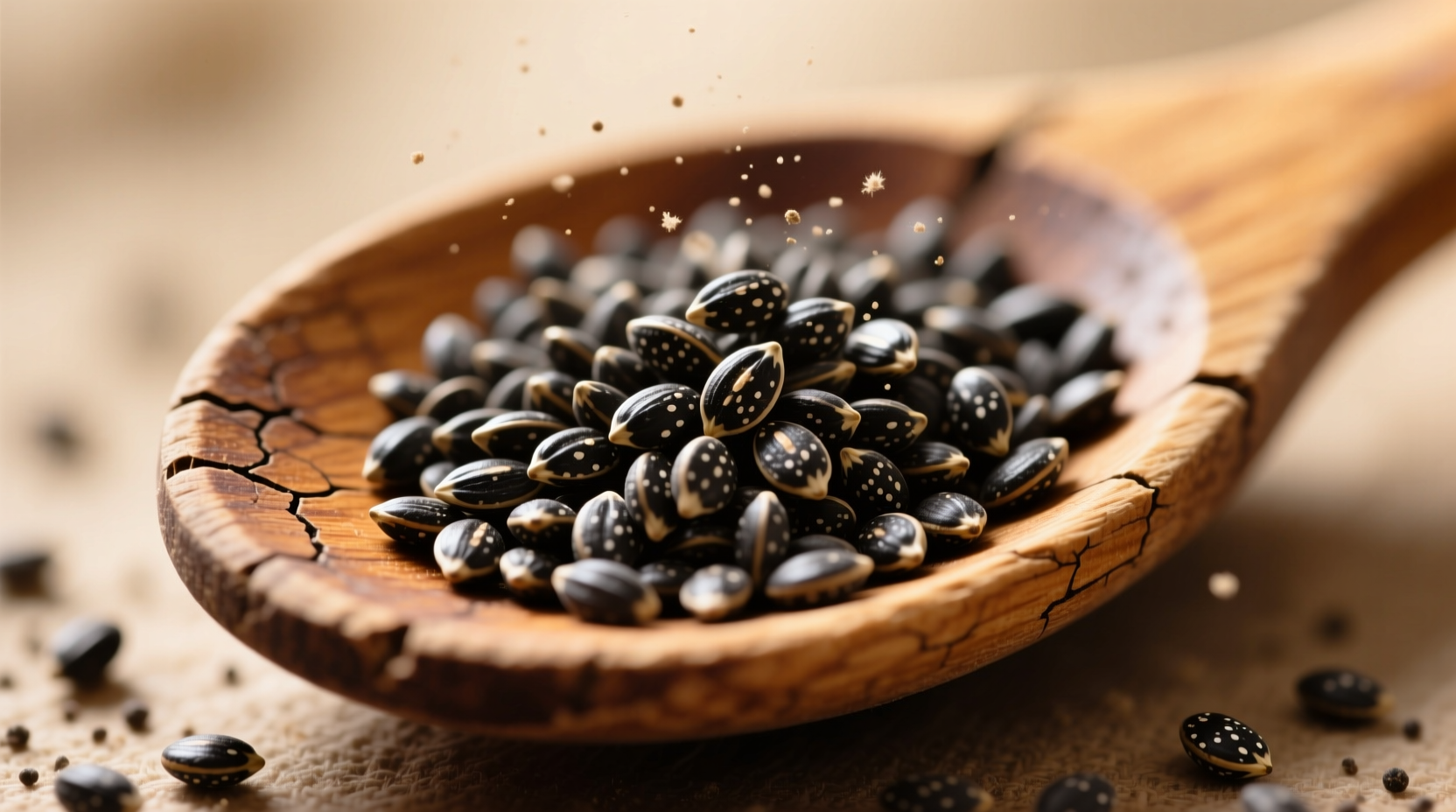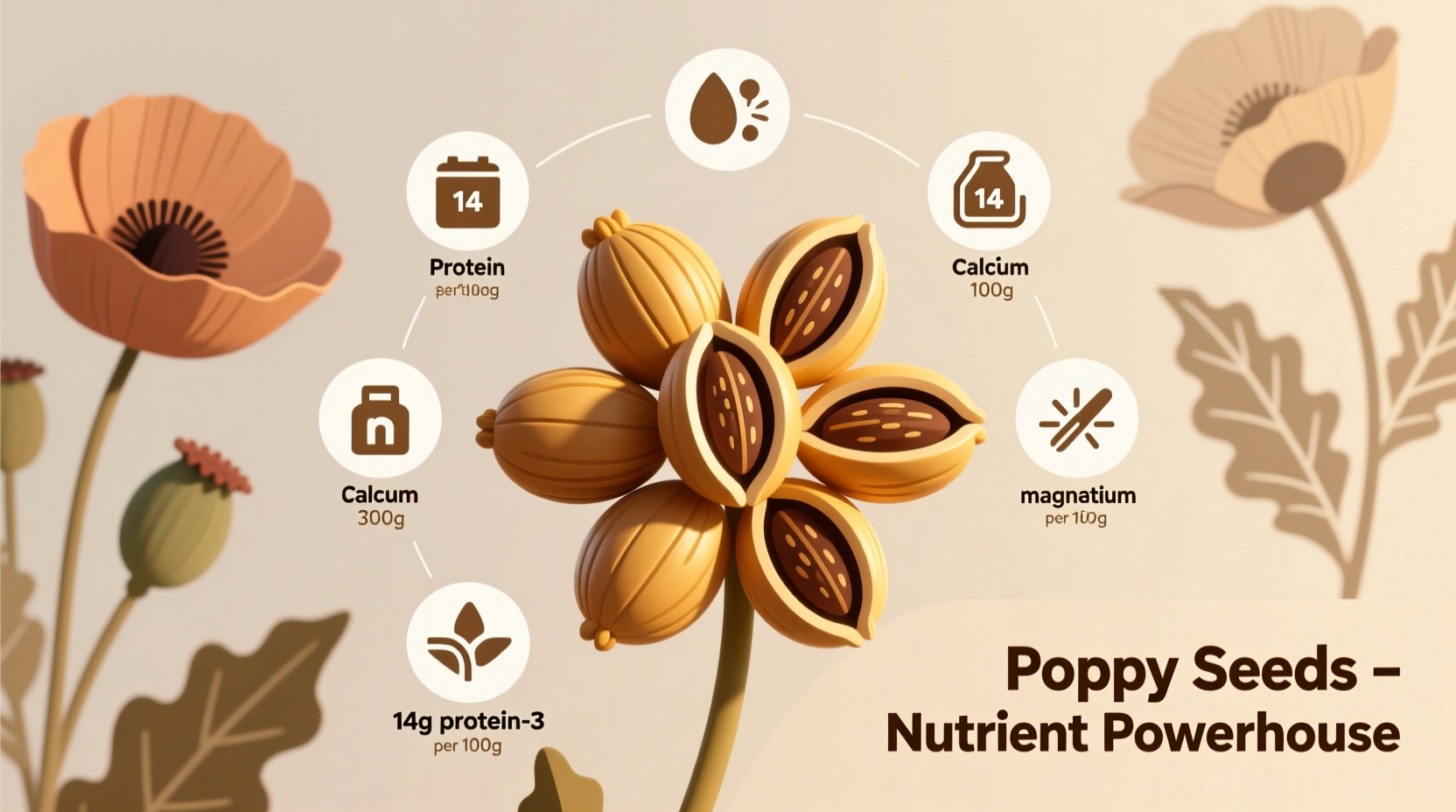Why Poppy Seeds Deserve a Spot in Your Pantry
While often used as a decorative topping for baked goods, poppy seeds offer far more than visual appeal. These tiny blue-black seeds from the Papaver somniferum plant contain a remarkable concentration of essential nutrients that support bone health, cardiovascular function, and digestive wellness. Unlike many other seeds, poppy seeds provide exceptional calcium content - one tablespoon delivers more calcium than a teaspoon of milk.
Nutritional Breakdown: What's Inside Those Tiny Seeds
Let's examine the complete nutritional profile of poppy seeds based on USDA FoodData Central measurements for a standard 1-tablespoon (9g) serving:
| Nutrient | Amount | % Daily Value |
|---|---|---|
| Calories | 41 | 2% |
| Total Fat | 3.6g | 5% |
| Saturated Fat | 0.4g | 2% |
| Monounsaturated Fat | 0.7g | - |
| Polyunsaturated Fat | 2.2g | - |
| Protein | 1.8g | 4% |
| Dietary Fiber | 1.8g | 6% |
| Calcium | 126mg | 13% |
| Iron | 1.1mg | 6% |
| Magnesium | 34mg | 8% |
| Phosphorus | 67mg | 5% |
| Zinc | 0.6mg | 5% |
| Copper | 0.1mg | 11% |
| Manganese | 0.3mg | 13% |
Key Nutrients That Make Poppy Seeds Special
Calcium Powerhouse
With 126mg of calcium per tablespoon, poppy seeds contain more calcium than most other seeds. This makes them particularly valuable for individuals who avoid dairy products. According to research published in the Journal of Food Composition and Analysis, the calcium in poppy seeds has good bioavailability when consumed with vitamin D-rich foods.
Healthy Fats Profile
Approximately 75% of poppy seeds' fat content comes from unsaturated fats, primarily linoleic acid (omega-6) and oleic acid (omega-9). While they don't contain significant omega-3s, their balanced fat profile supports cardiovascular health when consumed as part of a varied diet. The European Food Safety Authority recognizes the heart health benefits of replacing saturated fats with unsaturated fats like those found in poppy seeds (EFSA Journal 2010).
Dietary Fiber Content
The 1.8g of fiber per tablespoon contributes to digestive health and helps maintain stable blood sugar levels. Poppy seeds contain both soluble and insoluble fiber, which work together to support gut microbiome diversity. A study in the American Journal of Clinical Nutrition found that regular consumption of fiber-rich seeds like poppy seeds correlates with improved bowel function and reduced risk of diverticular disease.

How Poppy Seeds Compare to Other Common Seeds
When evaluating nutritional value of poppy seeds versus other seeds, they stand out for specific nutrients while falling short in others. Here's how they compare to similar serving sizes:
- Calcium content: Poppy seeds contain nearly 3 times more calcium than sesame seeds and 10 times more than chia seeds
- Iron levels: Lower than pumpkin seeds but higher than sunflower seeds
- Fiber comparison: Less fiber than chia or flax seeds but with better calcium-to-fiber ratio
- Protein quality: Contains all nine essential amino acids, though in smaller quantities than hemp seeds
Practical Ways to Maximize Nutritional Benefits
To get the most health benefits of poppy seeds in daily diet, consider these evidence-based strategies:
Optimal Preparation Methods
Unlike some other seeds, poppy seeds don't require grinding to access their nutrients since their soft shells break down during digestion. However, research from the National Center for Biotechnology Information shows that lightly toasting poppy seeds (at 150°C for 5-7 minutes) increases the bioavailability of certain minerals by reducing phytic acid content.
Daily Serving Recommendations
Nutritionists generally recommend 1-2 tablespoons of poppy seeds daily to gain nutritional benefits without excessive calorie intake. This ideal poppy seed consumption amount provides substantial minerals while keeping fat intake within healthy parameters. The American Heart Association supports including small portions of nutrient-dense seeds like poppy seeds as part of a heart-healthy diet pattern.
Culinary Pairing Strategies
To enhance nutrient absorption:
- Combine with vitamin C-rich foods (citrus, bell peppers) to boost iron absorption
- Mix with dairy or fortified plant milks to maximize calcium utilization
- Add to whole grain dishes to balance the omega-6 to omega-3 ratio
Important Considerations and Limitations
While poppy seeds offer impressive nutrition, there are several factors to consider when incorporating them into your diet:
Opium Compound Content
Poppy seeds naturally contain trace amounts of opiate alkaloids. The FDA notes that normal culinary use (1-2 tablespoons) presents no risk, but excessive consumption could potentially trigger drug tests. For most people following safe poppy seed consumption guidelines, this isn't a concern - the European Food Safety Authority has determined that typical culinary use poses no health risks (EFSA Journal 2016).
Nutrient Balance Considerations
Poppy seeds are relatively high in omega-6 fatty acids compared to omega-3s. To maintain a healthy fatty acid balance, nutrition experts recommend consuming them alongside omega-3 rich foods like walnuts, flaxseeds, or fatty fish. The World Health Organization suggests an optimal omega-6 to omega-3 ratio between 2:1 and 4:1 for cardiovascular health.
Conclusion: Making Poppy Seeds Work for Your Nutrition Goals
Poppy seeds represent an often-overlooked nutritional powerhouse that can significantly enhance your mineral intake, particularly calcium and magnesium. By understanding their specific nutrient profile and incorporating them strategically into your meals, you can leverage their unique nutritional advantages while maintaining a balanced diet. Remember that while poppy seeds offer impressive nutritional benefits, they work best as part of a varied diet that includes multiple seed types and nutrient sources.











 浙公网安备
33010002000092号
浙公网安备
33010002000092号 浙B2-20120091-4
浙B2-20120091-4